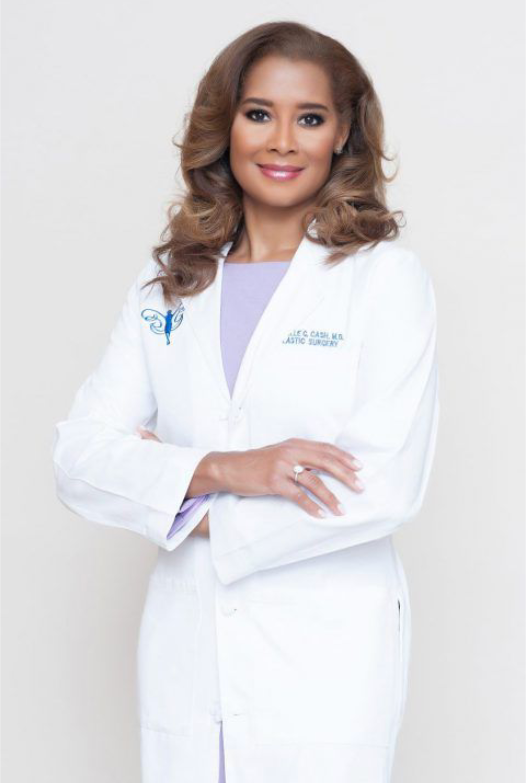A Need for Diverse Plastic Surgeons and Nurses

[ad_1]
“For plastic surgeons, it is difficult to assess what the actual numbers are because the plastic surgery societies are just beginning to collect that data,” says Dr. Cash. “But the numbers are around 1.8% for Black or African Americans, and 5% respectively for Hispanic or Latinos, and reflect an even greater degree of underrepresentation for African Americans.”⁴
Dr. Nyame says it’s time to level the playing field and address the disparities by breaking down barriers, both systemic and financial, that are blocking people of color. Dr. Nyame grew up in a small African village and has overcome many obstacles to be where he is—a Harvard University graduate and Board-Certified Plastic Surgeon. Through his personal journey, he feels compelled to showcase what’s possible for others in a responsible way. “I will never forget seeing a person of color in charge of an operating room, it inspired me,” says Dr. Nyame. “I wish every young person could see themselves represented in the field they want to pursue. It shows them what is really attainable.”

Dr. Cash echoes this sentiment saying, “One of the main reasons I believe that there is such underrepresentation in plastic surgery is a lack of available mentoring for URiM (Underrepresented in Medicine) students. For example, there are four historically-Black medical schools in the US and that represents only 2% of all medical schools and yet in 2019, these schools graduated 10% of the Black doctors in this country.⁵ And of these four medical schools, none have a plastic surgery training program.” When first opening her practice, Dr. Cash didn’t set out to be the first African American woman plastic surgeon in the state of Texas, but that’s exactly what happened. “My plan was not to be a ‘Black’ plastic surgeon but to be a successful plastic surgeon who was also a Black woman.”
Normalizing Plastic Surgery to Work Toward Accessibility
To fully understand the need for Black plastic surgeons, you just have to look at how far patients are willing to travel. Dr. Nyame has seen patients from as far as Nigeria and Berlin in his North Carolina office while Dr. Cash has had patients located as far as Abu Dhabi come to her Texas practice. “I just recently had a patient drive from Las Vegas for her breast reduction and I am getting more patients from California flying in for their breast augmentations,” says Dr. Cash. She also references a study that found that African American patients were more likely to be willing to travel greater than 100 miles for a surgeon who shared the same ethnicity or race or consider international surgery.⁶
Many patients have already overcome significant challenges before they even seek out a Black plastic surgeon, including the topic of plastic surgery itself being a big taboo within the Black community. Often people are made to feel ashamed or are told that they don’t need to change their appearance in any way. “[Black patients] think they just have to live with it, especially when it comes to their body after pregnancy,” says Dr. Nyame. “As a doctor, my job is to help patients as they work to restore confidence in themselves. I do this by addressing their concerns in a safe, accepting space.” And Dr. Cash agrees, adding, “It is important to understand that plastic surgery, when done correctly, in my opinion, should enhance a person’s beauty, not create an unnatural or weird appearance.” She also notes, “I think education is key to helping patients understand the realities of plastic surgery, including safety information and risks, and how it can benefit patients of all colors.”
Moving In the Right Direction
Serving as the taskforce chair for a well-known aesthetic society’s Externship Program, Dr. Cash and others help to match URiM students from medical schools without plastic surgery programs with a mentor within a respected plastic surgeon society. The program provides funding and opportunities for students to be exposed to the clinical practice of aesthetic plastic surgery, participate in a research project, and to attend The Aesthetic Society’s annual scientific conference. There are also activities and opportunities for these students to network with the leaders in Aesthetic Surgery, industry partners, and attend scientific presentations and forums.

And there is also a research and education program organized by a well-respected university, which prepares third-year URiM students with the tools needed to be successful in their elective rotations in plastic surgery and their interviews. During the two-day program, students are provided networking opportunities with practicing plastic surgeons and current plastic surgery trainees, didactic plastic surgery lectures, and technical skills training such as suturing and cadaver dissections.
If you’re interested in learning more about the life of a Black plastic surgeon, take a peek inside this world through the eyes of these two doctors. Follow Dr. Cash on Instagram to learn more about her experience and see patient results. Then check in with Dr. Nyame who shows all aspects of his life, from work life to dad life on his Instagram. Follow him to see what’s possible for you.
Natrelle® Breast Implants IMPORTANT SAFETY INFORMATION AND APPROVED USES
Breast implants are not considered lifetime devices. The longer people have them, the greater the chances are that they will develop complications, some of which will require more surgery.
Breast implants have been associated with the development of a cancer of the immune system called breast implant–associated anaplastic large cell lymphoma (BIA-ALCL). This cancer occurs more commonly in patients with textured breast implants than smooth implants, although rates are not well defined. Some patients have died from BIA-ALCL.
Patients receiving breast implants have reported a variety of systemic symptoms, such as joint pain, muscle aches, confusion, chronic fatigue, autoimmune diseases, and others. Individual patient risk for developing these symptoms has not been well established. Some patients report complete resolution of symptoms when the implants are removed without replacement.
Who can get breast implants?
Natrelle® Breast Implants are approved for the following:
• Breast augmentation for women at least 22 years old for silicone-filled implants and for women at least 18 years old for saline-filled implants.
Breast augmentation includes primary breast augmentation to increase the breast size and revision surgery to correct or improve the result of a primary breast augmentation
• Breast reconstruction. This includes primary breast reconstruction to replace breast tissue that has been removed due to cancer or trauma or that has failed to develop properly due to a severe breast abnormality. This also includes revision surgery to correct or improve the result of a primary breast reconstruction
Who should NOT get breast implants?
Breast implant surgery should NOT be performed in:
• Women with active infection anywhere in their body
• Women with existing cancer or precancer of their breast who have not received adequate treatment for those conditions
• Women who are currently pregnant or nursing
What should I tell my doctor?
Tell your doctor if you have any of the following conditions, as the risks of breast implant surgery may be higher:
• Autoimmune diseases (eg, lupus and scleroderma)
• A weakened immune system (eg, taking medications to decrease the body’s immune response)
• Planned chemotherapy or radiation therapy following breast implant placement
• Conditions or medications that interfere with wound healing and blood clotting
• Reduced blood supply to breast tissue
• Clinical diagnosis of depression or other mental health disorders, including body dysmorphic disorder and eating disorders
• Those with a diagnosis of depression or other mental health disorders should wait for resolution or stabilization of these conditions prior to undergoing breast implantation surgery
What else should I consider?
• There is a Boxed Warning for breast implants. Please see bold text at beginning
• Many changes to your breasts following implantation are irreversible. If you later choose to have your implants removed and not replaced, you may experience dimpling, puckering, wrinkling, or other cosmetic changes, which may be permanent
• Breast implantation is likely not a one-time surgery. The longer implants are in place, the greater the potential risk for complications. You will likely need additional surgeries on your breasts due to complications or unacceptable cosmetic results. Thus, you should also consider the complication rates for later (revision) surgery since you may experience these risks in the future
• Cancer treatments and surgery will affect the outcome and timing of breast reconstruction
• Breast implants may affect your ability to breastfeed, either by reducing or eliminating milk production
• Rupture of a silicone-filled breast implant is most often silent. Even if you have no symptoms, you should have your first ultrasound or MRI at 5 to 6 years after your initial implant surgery and then every 2 to 3 years thereafter regardless of whether your implants are for augmentation or reconstruction. If you have symptoms of or uncertain ultrasound results for breast implant rupture, an MRI is recommended. Additional imaging may be required depending on your medical history and status. The health consequences of a ruptured silicone gel-filled breast implant have not been fully established
• Routine screening mammography for breast cancer will be more difficult, and implants may rupture during the procedure. Perform self-examination every month for cancer screening and ask your surgeon to help you distinguish the implant from your breast tissue. Lumps, persistent pain, swelling, hardening, or changes in implant shape should be reported to your surgeon and possibly evaluated with imaging
What are key complications with breast implants?
Key complications include reoperation, implant removal with or without replacement, implant rupture with silicone-filled implants, implant deflation with saline-filled implants, and capsular contracture (severe scar tissue around the implant). Other complications include breast pain, swelling, asymmetry, wrinkling/rippling, implant malposition nipple complications, hypertrophic scarring, and implant palpability/visibility.
Talk to your doctor about other complications.
For more information, see the patient brochures at www.allergan.com/products.
To report a problem with Natrelle® Breast Implants, please call Allergan® at 1-800-624-4261.
The sale and distribution of Natrelle® Breast Implants is restricted to licensed physicians who provide information to patients about the risks and benefits of breast implant surgery.
References
1. Association of Racial/Ethnic and Gender Concordance Between Patients and
Physicians With Patient Experience Ratings.
2. United States Census Bureau.
https://www.census.gov/quickfacts/fact/table/US/RHI725222
3. AAMC. Figure 18. Percentage of all active physicians by race/ethnicity, 2018.
https://www.aamc.o rg/data-reports/workforce/data/figure-18-percentage-all-
active-physicians-race/ethnicity-2018
4. https://www.zippia.com/plastic-surgeon-jobs/demographics/ Zippia. PLASTIC
SURGEON DEMOGRAPHICS AND STATISTICS IN THE US.
https://www.zippia.com/plastic-surgeon-jobs/demographics/
5. AAMC. Table 10. U.S. Medical School Black or African American Graduates
(Alone or In Combination) From Historically Black Colleges and Universities
(HBCUs), 1978-1979 Through 2018-2019. https://www.aamc.org/data-
reports/workforce/data/table-10-us-medical-school-black-or-african-american-
graduates-alone-or-combination-historically
6. The Impact of Race, Age, Gender, Income, and Level of Education on
Motivations to Pursue Cosmetic Surgery and Surgeon Selection at an
Academic Institution
© 2023 AbbVie. All rights reserved. NATRELLE and its design are trademarks of Allergan, Inc., an AbbVie company.
NAT163464 08/23
[ad_2]
Source link
